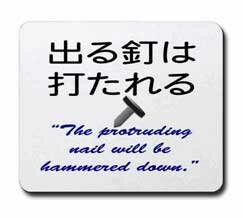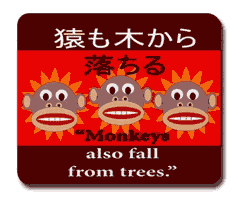
Departments
E d 's J a p a n e s e B l o g
(A r c h i v e s)
October 30, 2007
Omissions in spoken Japanese
The other day I was listening to a Japanese man as he spoke into his cell phone. He was on his way to join one of his colleagues. He asked:
今、どこ?
The classroom way of phrasing this sentence would of course be:
今、どこですか。
Omissions are common in spoken (and sometimes written) Japanese when the context is obvious. For a more in-depth exploration of this topic, see this article from the Japanese123.com archives.
October 27, 2007
Curious about Japanese Buddhism?
Buddhism, along with Shinto, is one the two major religions of Japan. Whereas Shinto is a native Japanese religion, Buddhism is an imported faith.
In 552, representatives of the Korean state of Paekche gave members of Japan’s court in the Yamato region an image of the Buddha. (The Buddha image was soon followed by a broad influx of cultural influences from China, including traditional Chinese medicine and literature.)
Not everyone was enthusiastic about Buddha and the new, foreign religion associated with him. Japan already had a native religion based on animist fertility rites and shamanism. Shinto was always a tolerant religion, and it included no doctrine of exclusivity. Theoretically, there was nothing to prevent a practitioner of Shinto from simultaneously practicing another faith. But then, as now, religion and politics were easily mixed. (continue...)
October 26, 2007
Will the Nova scandal make English-language teachers hard to find?
This is what one recently unemployed Australian English teacher believes:
Tristan Sime, a 37-year-old Australian who taught at Nova schools for seven years, said: "Brand-new Australians who recently came to Japan and have no Japanese language skills or other resources to find a new job had better go home if they are fired or the school goes bankrupt."
He said it would be difficult for other language schools to hire new foreign teachers because the Nova problem had damaged the image of English language education.
Maybe. But I am inclined to think otherwise. The aforementioned Sime is demographically unique among Eikaiwa (English-language conversation) teachers in Japan. Most eikawa teachers are twentysomethings who are right out of college, and just want to spend a few years in Japan before pursuing graduate work or the corporate world. They aren’t looking for long-term job security.
The eikawa route, by the way, has never been a path to long-term job security or big bucks. When I was a senior at the University of Cincinnati, I interviewed with a Japanese eikawa school that visited UC’s campus. When I asked my interviewer about my salary expectations, I was told frankly: “You aren’t going to get rich teaching English in Japan.” He also told me that the school rarely extended teachers’ contracts beyond three years.
This doesn’t mean, by the way, that there is anything wrong with going to Japan for a few years to teach English. If your Japanese skills aren’t up to par, this is a cost-effective way to give yourself some time “on the ground” in Japan.
On the other hand, if you do have strong Japanese language skills, then you can probably find more lucrative and secure employment in Japan. (This is especially true if you also have a technical degree and/or extensive job experience.)
October 24, 2007
The limits of machine-based translation
MT, or machine translation, is one of the most hotly debated topics among translators. Not surprisingly, most human translators take a dim view of MT.
I have played around with Babelfish and other internet-based translators, using languages I already know, as well as languages that I am still learning.
I used to be a translator myself, so I suppose I began my experimentation with the subconscious hope that I would find the machine translation to be laughable. Not so fast. Babelfish is not perfect; but it is pretty good for basic, expository texts… I have come to the conclusion that some low-level, routine translation tasks can now be effectively handled by software.
But there are still limits to what software can do, as blogger John Timmer reminds us over at Ars Technica.
October 23, 2007
Letters from Iwo Jima
I finally got around to watching Letters from Iwo Jima over this past weekend.
While 98% of the dialogue is in Japanese, it will probably be difficult for you to follow unless your language skills are already quite advanced. But that is no reason not to watch. Even if you only catch a word here or there, it’s still listening practice. (And the English subtitles allow you to “cheat.”)
As for the movie itself: I would give it 3 stars out of 5. The characterizations are intricate and lifelike; and the movie doesn’t preach at you---contrary to my expectations.
But the plot did slow down to an unforgivably slow pace at times. At 140 minutes, I thought that the film was about 30 minutes too long. It could have used another round of editing.
October 21, 2007
刹那
(せつな)
Definition: momentary; temporary
As noted above, the dictionary definition of刹那的 is “momentary.” This, however, is not the entire scoop on this word. This entry carries a negative connotation, usually implying that something is fleeting in nature as well as vain, harmful, or hedonistic. This is evident by some of the frequent combinations that occur with 刹那的:
Related words:
刹那的な (せつなてき な)momentary
刹那主義 (せつなしゅぎ) the principle of living only for the moment
Usage Examples:
刹那的歓楽(せつなてきかんらく)momentary pleasure
刹那的に生きる (せつなてき に いきる)to live for the moment; to be driven by impulse.
成金は刹那的に金を使う (なりきん は せつなてき に かね を つかう) the nouveau riche spend money according to whim
今を刹那的に体験する (いま を せつなてき に たいけん する) to experience the present [with little regard for the future]
刹那主義 (せつなしゅぎ) the principle of living for the moment
刹那的歓楽 (せつなてき かんらく) momentary pleasure
In the sentence below, an author asks why the nouveau riche (成金(なりきん))of Japan think only of vain, wasteful expenditures.
なぜ日本の成金は、刹那的な浪費ばかりを考えるのでしょうか。
Source: Naoyuki Hashimoto
October 20, 2007
Language skills and career success
This article is written for an Indian audience, but it may be inspiring for those of you have wondered "Will Japanese language skills help me in my career?"
Being a polyglot pays. Students aspiring for a global career realise this and are learning multiple foreign languages. With French and Russian taking a backseat, students (along with the corporate) are focusing on Japanese, Spanish, German and Chinese.
This is understandable as countries like Japan, China, the US and Italy are hiring individuals who have the technical skills coupled with the knowledge of a foreign language. The growing market of multinational companies, IT industries, call centres and the urge to widen business operations worldwide has further added to the trend. ---ExpressIndia.com
October 18, 2007
Indiana high school students diving into "real" Japanese
Evansville, Indiana’s CourierPress reports that some local high school students are exposing themselves to practical listening exercises in a variety of foreign languages---including Japanese:
Kelly Hampton, Max Jones, Chris Calvert, Nicki Reed and Tyler Geren, third-year Japanese language students from Castle High School, laughed as they tried to keep up with Sakiko Sakamoto's animated tour and tales of her summer vacation studying at Harlaxton College — all told in her native Japanese.
"I've been able to understand some of it," Geren said. "Japanese people speak really fast."
The annual “Linguapalooza” event is held at the University of Evansville. This seems to be a good supplement to ordinary classroom studies. It is always helpful to remind the students that foreign languages really do exist outside the textbook.




